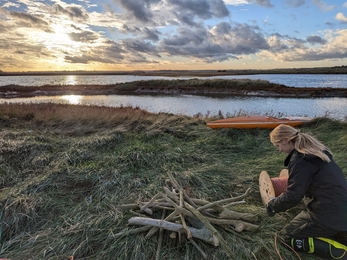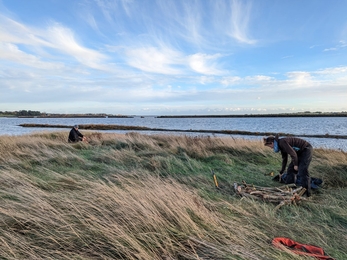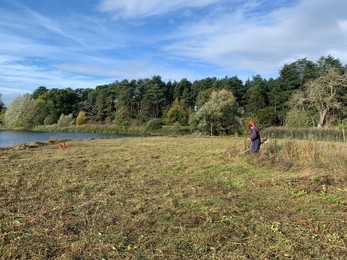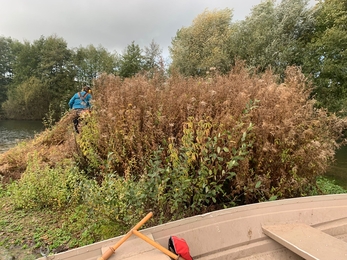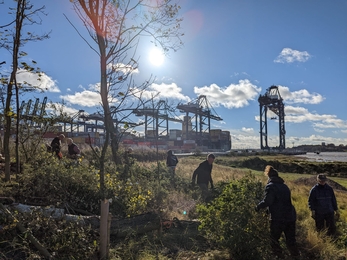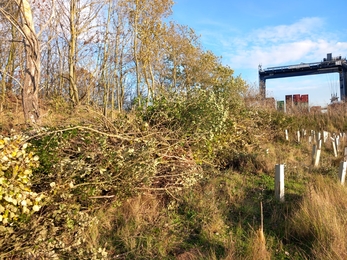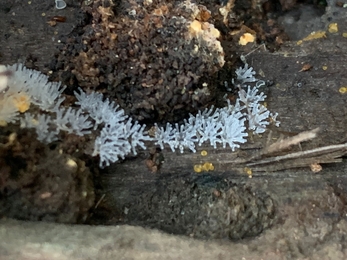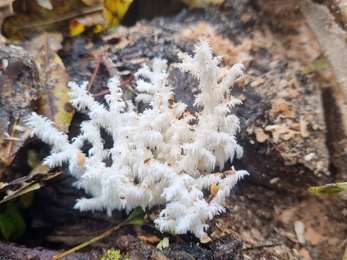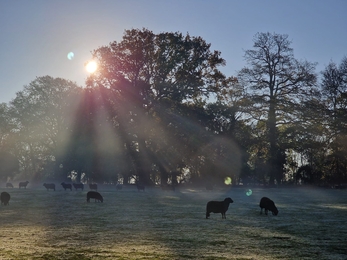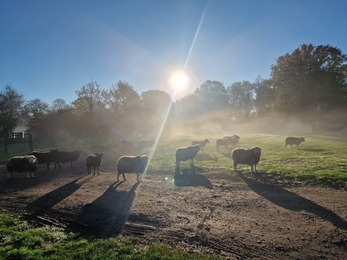Weekly wild news from our reserves - 18 November 2022
Misty sheep at Foxburrow - Anneke Emery
Warden Gavin Durrant was thrilled to get this first glimpse of an otter cub with its mother at Carlton Marshes. This one is approximately 6 months old. Otter cubs stay with their mothers until they are 12-14 months, during which time they learn to fish and fend for themselves.
Marsh harrier travels south
Local birder Paul Holmes spotted this female marsh harrier at Trimley Marshes recently. The wing tag information shows the bird was tagged on 15th July at Hardley in Norfolk. This means it was found 116 days after it was tagged, having flown 73km south.
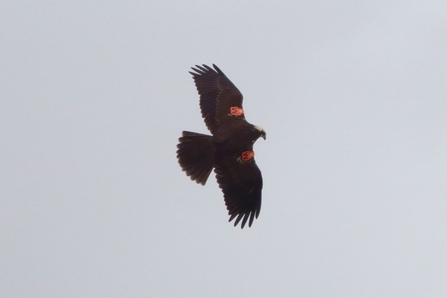
Marsh harrier – Paul Holmes
Encouraging spoonbills
Some of the South East Suffolk team spent a day building artificial ‘nests’ to encourage spoonbills to breed on the reserve. These nests potentially give the birds something to add nest materials to (typically twigs and small branches) and are fixed down to prevent them from floating away on any surge tides. The structures also help to raise potential nest heights slightly above any huge tides. We do not expect spoonbills to move in immediately, but this might just tempt a pair to linger and consider a nest site on the reserve one year in the future.
Happy grazers
The conservation grazing Exmoor ponies were looking particularly chilled and content in the early morning sunshine at Carlton Marshes.
Island cutting
The Lackford Lakes staff and volunteers have almost finished the annual island cutting out on the lakes. The smallest island takes one person 10 minutes, and the biggest is a couple of days work! Cutting the vegetation annually helps to maintain the islands’ floristic diversity - they're effectively mini wildflower meadows. The ducks and waders also enjoy having a poke around for tasty morsels once they're cut and it encourages them to nest there the following spring.
Willow work party
At Mickle Mere, our wonderful volunteers helped the team clear areas of willow scrub to prevent it from taking over wetter areas of the grazing meadow beside the mere. They left clumps of younger willow to ensure enough cover for birds.
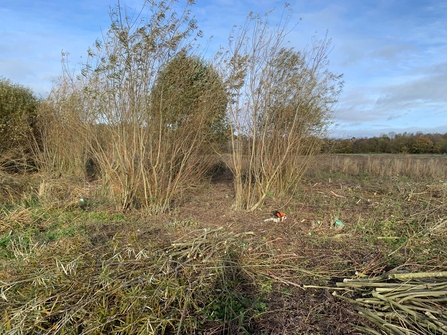
Work party at Mickle Mere - Linsey Grey
Dead hedge
South East interns Ella Broom and Rowan Tomsett joined the amazing volunteers at Trimley Marshes thinning holm oak and white poplar and creating a dead hedge. This will increase structural diversity and also let in more sunlight to benefit orchids and other ground flora in danger of being swamped by fallen leaves.
Wind pump maintenance
The South East team helped with troubleshooting and maintenance on the wind lift pump at Stanny Marshes recently. Once the pump is working again it will start delivering water to a lagoon on site, which should in turn attract overwintering wildfowl and waders.
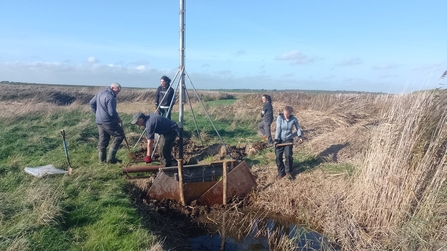
Site works at Stanny Marshes – Andrew Excell
Veteranisation
The Bradfield Woods team have been busy ‘veteranising’ trees on the reserve. Veteranisation involves intentionally damaging parts of a tree to create features which would naturally occur over a longer period. For example, stripped bark, cavities and snapped branches. This damage causes new habitats to form on the tree with dead and decaying sections supporting more diversity of life.
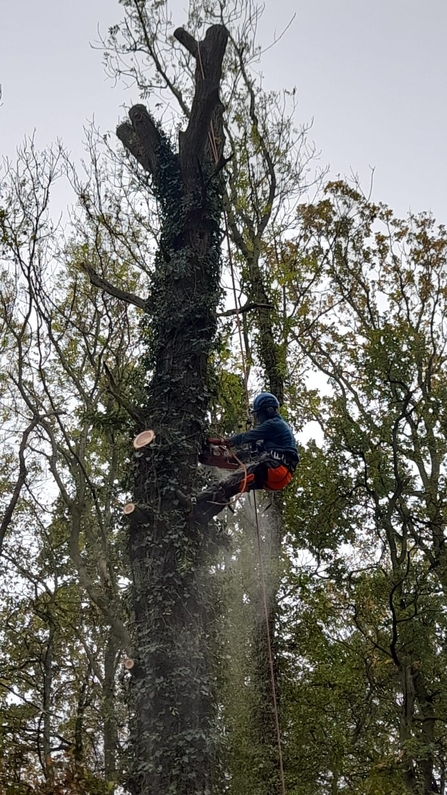
Tree veteranisation at Bradfield Wood - Alex Lack
Bee orchid rosette
A small orchid, the bee orchid has a rosette of leaves at ground level. In summer two leaves will grow up the stem as a sheath and large flowers with pink sepals that look like wings, and furry, brown lips that have yellow markings on, just like a bee.
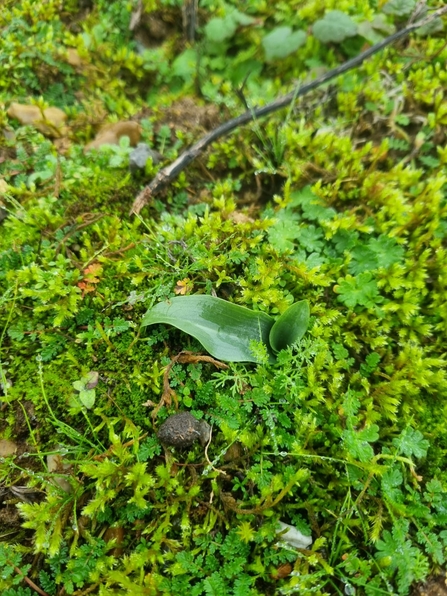
Tiny bee orchid leaf rosette at Lackford Lakes – Joe Bell-Tye
Devil’s coach horse
The devil's coach horse is a common beetle in gardens, hedgerows and grassland. Devil's coach horses are voracious predators, emerging after dark to prey on other invertebrates, and using their pincer-like jaws to crush them. They are fast-moving, preferring to run along the ground rather than fly. They are well-known for curling up their abdomens like the tail of a scorpion when threatened and emitting a foul-smelling substance from their abdomens. Beware - they can also deliver a painful bite!

Devils coach horse at Lackford – Joe Bell-Tye
Toothed coral fungi and coral slime mould
The reserve teams have spotted some more delightful fungi this week, and a mysterious slime mould! Slime moulds belong to their own classification of single celled organisms, which can move around as they consume yeasts, bacteria or plant debris. Visitor Officer Hawk Honey found this translucent, branched coral slime mould living on dead wood at Lackford Lakes. Another life form resembling coral was also seen at Lackford, this time a fungus – toothed coral.
Fantastic fungi
Chainsaw training
Our reserves interns get extensive training as part of their year long placements, which includes a chainsaw qualification. This week their chainsaw course continued with some practical tests in the woods. They’ve been thinning out some smaller trees in Miller’s Wood to promote stronger growth in retained trees, while also providing future firewood for the learning room at Foxburrow Nature Reserve.
Misty morning light
The morning dew and sunlight made for some lovely scenes at Foxburrow Reserve this week.
Tractor delivered by boat
After returning the RSPB's rotavator to Berney Marshes the North East team made use of the Reedham Ferry to drop the tractor at Beccles for its service.
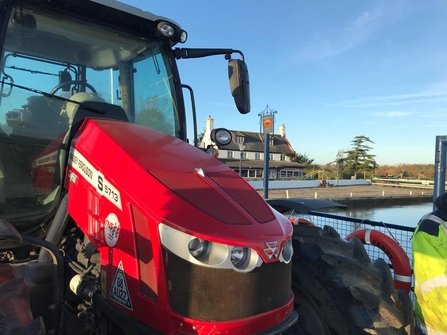
Tractor by boat - Andy Hickinbotham
Come rain or shine...
Wardens Andy Hickinbotham and Dan Doughty have been out in all weathers installing gates and replacing fences at Oulton Marshes.


